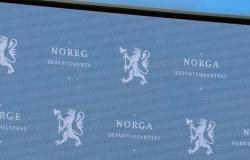How can we abolish the Norwegian constitutional monarchy so that even royalists are satisfied? It is not as difficult as one might think.
Tuesday and Wednesday this week our future king, Crown Prince Haakon, is in Tromsø to shine a light on, among other things, the northern tip of Tromsøya, where a group of young people will demonstrate how to free dive.
Certainly pleasant too both him and the young people, and both we and other media will stand there and freeze in the spring stones to watch it all.
The great interest for the doings and deeds of royalty are a paradox. We follow them from cradle to grave, and not least “the colorful press” has its own specialized journalists and editors who follow the royal family extra closely. I don’t get it for several reasons.
That one of that the world’s leading democracies should stick with a head of state who is not elected by the citizens, but who has received his office as an inheritance from his father, is incomprehensible. I completely agree that the king and queen appear to be nice people, that the crown prince and Märtha Louise are certainly both kind and straightforward, and that the members of the royal house are, by all accounts, both hardworking and diligent as ants.
But it is after all, it really doesn’t matter if you have to be principled, because it is the principle itself that is the problem. That Norway, Sweden, Denmark and several other countries in Europe and the rest of the world stick with a state custom that is founded on autocracy, feudalism and inheritance is, to say the least, strange in 2024.
Now you can it is argued that the king’s role today is mainly ceremonial and that his duties must be seen as predominantly representative. But it is actually just over 200 years ago (1814) that the monarchy – where the king ruled the country at his own pleasure and by the grace of God – was abolished in this country. And the legacies and inheritance from the monarchy are still alive.
Just take one such a case as that the king cannot be brought to justice. He should – theoretically – be able to go out on Castle Square with a shotgun and shoot passers-by without being prosecuted or punished. “The king cannot be blamed or accused” is stated in section five of the constitution. The fact that old King Olav, King Harald and today’s Crown Prince Håkon have voluntarily paid a couple of speeding fines does not change the fact that the king is legally “inviolable” and immune.
The government can either not – formally – make decisions or exercise their authority as long as the king has not approved the whole thing in the cabinet. The king and crown prince are also – together with the chief of defense – the only four-star generals in Norway.
Another matter what is startling is that the monarchy still has such strong support among apparently prosperous people. Eight out of ten Norwegians stand behind Harald Rex & Co – or they are totally indifferent to the whole Sulamite. The Republicans are in a clear minority.
When I discuss the monarchy’s to be or not to be with friends and acquaintances, there are a couple of arguments that are recurring. The already mentioned argument that our royal house consists of “such beautiful people” is perhaps the most common. Argument number two is that “you know what you have, but not what you get”. Explicitly, this means that we risk getting a head of state like Donald Trump or Sylvi Listhaug, Jonas Gahr Støre or Petter Stordalen.
A president can one, however, gets rid of in the next election, while a king or a queen we are stuck with until he or she leaves with death. Just look at the situation in my other homeland, Sweden, where Carl “Tjabo” Gustav has been our king since 1973, and in the course of 40 years he has become notorious as a skirt hunter and worse.
Then you can after all, turn the tables and point out what we can get if we are allowed to choose for ourselves. Presidents such as Nelson Mandela, Václav Havel, Uhro Kekkonen, Charles de Gaulle and Vigdís Finnbogadóttir were both elected – and elected – by their own voters. None of these stand behind our king when it comes to statesmanship and integrity.
Now I am so realistic that I understand that the Norwegian royal house is not going to be dissolved overnight. It is very popular with most people. Only two out of ten are direct opponents, and want a republic. But the fact that many people want a continuation does not make a constitutional monarchy any more right and proper. It is still wrong in principle that someone is elevated above everyone else only because of genetics.
So what can one does to rectify such a strange thing? The first step that should be taken is the same as that taken in 2012 when the Norwegian state church was abolished. The church and the state then chose to go their separate ways, and although the two parted as good friends, the separation is fundamental and irrevocable. The Norwegian state does not get involved in what the church rules with, and vice versa.
The same should happen between the state and the royal house. We should abolish the formal role of the Norwegian royal house, and so to speak, separate the crown from modern Norwegian democracy.
Then we can leave it to the royal house to govern itself in the same way as the Church of Norway. The church has become an independent and autonomous organization that is allowed to govern itself without interference from others.
The same will a liberated royal house could do, and I actually think that it would feel like a liberation for many in the yard. The members of the royal family have large fortunes – in total several hundred million kroner – which could finance the operation of their own organisation.
It has been tried before, both Greece and Italy have ex-kings and ex-queens. There you have ex-royals who do not have formal roles in the modern democracies, but the interest in them from the weekly press is still great. Then those most interested can follow princes, princesses, princes and princesses closely without the rest of us having to relate to them “for real”.
If the development is the same as in the Norwegian church, interest in the members of the royal house will slowly but surely decline and become smaller and smaller, and in a generation or two the strange anachronism will disappear into the historical fog, along with lords, counts, countesses, dukes and other symbolic aristocracy we have already got rid of.






